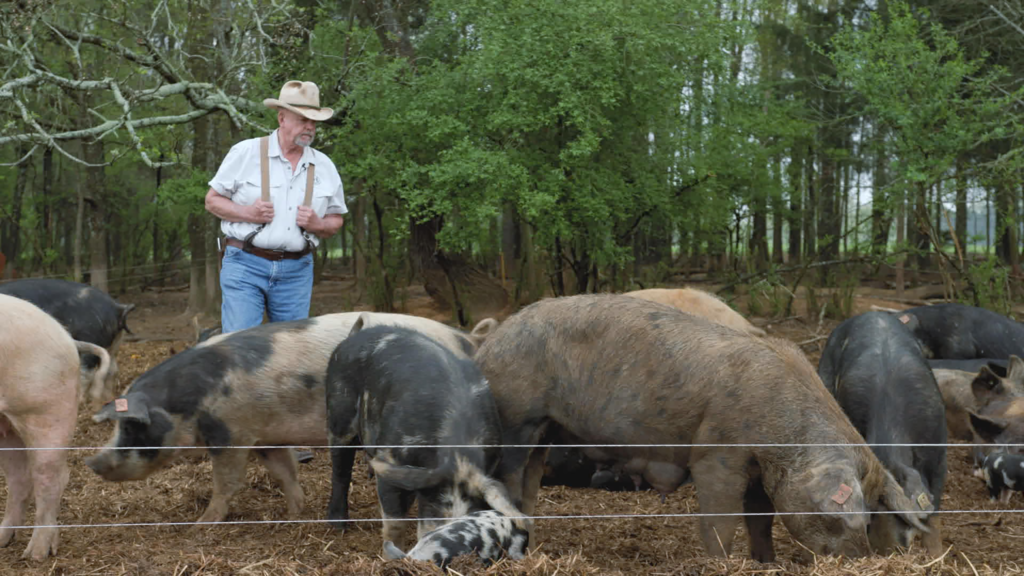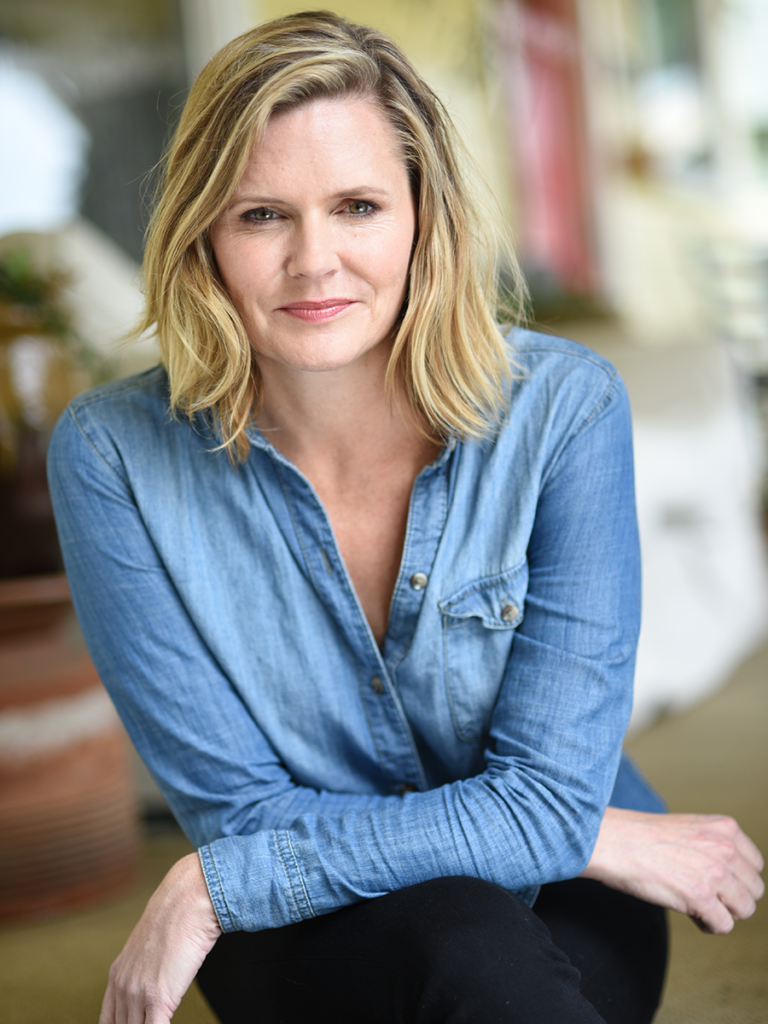At one point in Food and Country, a documentary that truly puts agricultural economics and the impact on our nation’s food production system into a clear perspective, journalist and food writer Ruth Reichl sums up the precarious situation precisely. She mentions that it feels like a “terrible failure” because the problems were already being talked about in the 1970s but then all of us were “sidetracked by deliciousness.”
While she says that as a society, collectively, we should feel culpable and devastated, Reichl offers a good bounty of hope. She discovers an impressive sampling of farmers, ranchers, chefs and innovators who demonstrate that prioritizing the values of socially responsible and sustainable values in agricultural practices and the business of food production can work economically and to everyone’s nutritional benefit.
Directed by Laura Gabbert, the film, which premiered at Sundance, stands out as the first substantive look at the emerging impact of the COVID-19 pandemic and shift in awareness about the country’s food system. As soon as the pandemic descended upon Americans three years ago, Reichl already had thought about the implications for restaurants, chefs, farmers and workers. With on location interviews out of the question at the outset, Reichl turned to Zoom. Instead of the formal interview, she deployed the journalistic approach that distinguished her work at the Los Angeles Times, New York Times and at Gourmet magazine. The Zoom recordings were freestyle conversations, which captured the emotions, thoughts and ideas, which the film’s subjects contemplated, as they considered the best ways of saving their businesses and keeping workers afloat.
In Los Angeles, Minh Phan, owner of Porridge and Puffs, described the challenges of figuring out online orders and later outdoor dining. At first, Phan felt disgruntled, grading the initial experiment with a A- for food and C- or a D for service. She tried to ensure that those working either in front of the house or in the kitchen would be paid equitably. Ultimately, the restaurant won top honors by a local publication. Reem Assil was hoping to keep her Oakland, California Arab bakery going and she converted the business to a worker-owned collective.

Reichl’s Zoom conversations would be excellent preparation for later production phases when camera crews could go to locations around the country. Viewers will recognize well-known chefs in the film including Alice Waters, whom Reichl has known for 50 years. Internationally known chef Marcus Samuelsson gave Reichl a tip about women setting up small farms to grow fresh produce in Harlem and the Bronx. In 1920, 19% of American farms were Black-owned and today, less than 1%. In the state of New York, only 139 out of 57,000 farms are Black-owned. Karen Washington, who established Rise and Root Farm in the South Bronx, talked about the experience of growing a tomato and biting into it for the first time. “It rocked my world,” she said, adding that she sees the small farm as an opportunity to confront the risks of diabetes, hypertension and other medical conditions which have been prevalent in the community.
The rippling waves of the pandemic-related economic storm are well documented for the impact they leveled upon independent growers and farmers. As one interviewee highlighted, while restaurants could furlough their works, farms could not be put on furlough. One owner talked about starting from zero in making home delivery an option because they could not throw out produce, which was perishable within a short amount of time. Steve Stratford, a Kansas cattleman, spoke bluntly not just about the meatpacking industry’s oligopoly. Tyson Foods, Cargill, National Beef, and JBS control more than 80% of the market collectively. He also talked about the lack of political will to deal with the problems. While the producers were going broke, the middlemen were reaping the headwinds of beef prices doubling within 60 days during the pandemic.
The most compelling scenes highlight ingenious approaches many independent farmers are taking. Most importantly, Food and Country offers the consensus that solving these problems will be achieved not by scaling up for size but for scaling through replication. Bren Smith, a former commercial fisherman, co-founded Greenwave to scale regenerative ocean farming. With the base in the waters off Long Island Sound. Alinea’s Executive Chef Grant Achatz tipped Reichl to White Oak Pastures in Bluffton, Georgia.
The story of Will Harris and his family is perhaps the most heartening and representative of the epiphany to take away from watching Food and Country. The average age of the American farmer is 64 and Harris is 65 but his spirit and his embrace of thoughtful changes to traditional farming are inspiring.
A quarter of a century ago, Bluffton was a near-dead town and Harris, part of the fourth generation of a family that has been farming, had become disillusioned. Seeing the problems of disease and negative impacts of confining animals and livestock, Harris decided to change it up by freeing the animals from the pens and stocks. Eventually, the soil was teeming with life. To avoid the risks of watching revenue and profit margins diluted by middlemen in the food processing end of the market, Harris, who says he was blessed with inherited equity, built slaughterhouses on the farm. He adds that he sees himself as a land steward and herdsman, not as a meat processor.
However, the point of what Harris has accomplished is not to prove a model that could be scalable in size but to demonstrate that it could be replicated in every agricultural county throughout the U.S. In Bluffton, which had peaked as a town around 1900, the community’s economic life has been revived. White Oak Pastures employs 176 people, making it the largest employer in the state’s poorest economy. The town is being revitalized, and as the case of the middle daughter shows, young people have a place in a new generation of farming. Harris said that farming is not as hard as some people make it out to be, adding, half-jokingly, that a farmer’s work is not as hard as a roofer,
He mentioned a novel collaboration with a solar power company which was concerned about soil erosion and quality in the area. Normally, the solution would be to use fertilizer and other chemicals. Instead, an army of chickens, ducks and sheep accomplished what was necessary, not only preventing erosion but also enhancing the quality of organic matter in soil. Harris talked about how Bermuda grass, which was once prevalent, was growing again.
After the foreboding tone of the documentary’s opening, the film takes viewers on a journey that grows steadily into an optimistic chronicle encouraging all of us to recommit to the values of food as a thoughtful society. Amplifying the documentary’s tone is Ryan Rumery’s score. The composer has worked with Gabbert on other films, notably City of Gold, which premiered at Sundance in 2015 and was about food writer Jonathan Gold, and Ottolenghi and the Cakes of Versailles.

In an interview with The Utah Review, Rumery talked about the process, especially in the early days when Reichl was off and running in carrying out conversations on Zoom. “I started with smallish lo-fi iPhone piano demos and then it became more realized and produced. But, Zoom fatigue set in, and once they began location shots in January 2021, the task of scoring changed.”
Rumery’s score fits beautifully within the narrative arc which crisscrosses the country frequently throughout the film. It starts with a minimalistic drone effect, reflecting the uncertainty of the direction it will take when Reichl started in March 2020. Throughout the film, the music gradually warms and fleshes out its lines, especially as Rumery focuses on tones and textures to mark the urban or rural landscape featured in a scene. “Instead of jump cuts, I inserted breaths in the film, to give everyone a moment to take in the sense of each place featured in the film,” he explains. Rumery worked with the editors to match the vibes of the music with the vibes of the transitions from a scene and character to another.
Before Rumery shifted to composing film scores, he had focused on theater. His last show score was for the Broadway show Between Riverside and Crazy, which featured Common, rapper-turned-actor. In 2017, he participated in the Sundance Institute’s Composes Lab, adding that learning from Peter Golub, who directs the Sundance film music program solidified his desire to pursue film composing.
For more information about festival screenings and tickets, see the Sundance website.

